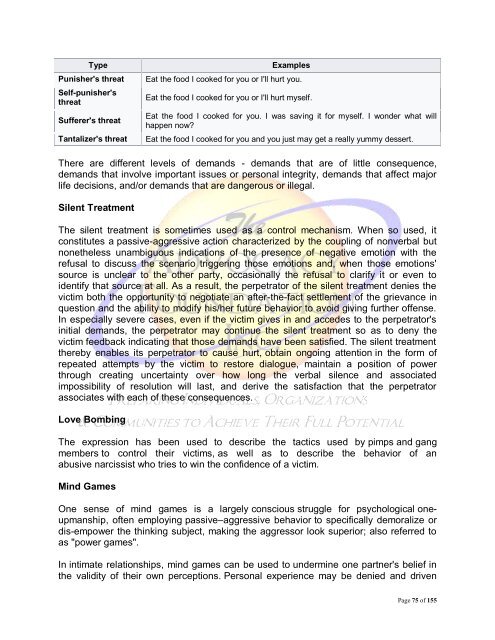Organizational Dysfunction
Organizational Dysfunction
Organizational Dysfunction
Create successful ePaper yourself
Turn your PDF publications into a flip-book with our unique Google optimized e-Paper software.
Type<br />
Punisher's threat<br />
Self-punisher's<br />
threat<br />
Sufferer's threat<br />
Tantalizer's threat<br />
Examples<br />
Eat the food I cooked for you or I'll hurt you.<br />
Eat the food I cooked for you or I'll hurt myself.<br />
Eat the food I cooked for you. I was saving it for myself. I wonder what will<br />
happen now?<br />
Eat the food I cooked for you and you just may get a really yummy dessert.<br />
There are different levels of demands - demands that are of little consequence,<br />
demands that involve important issues or personal integrity, demands that affect major<br />
life decisions, and/or demands that are dangerous or illegal.<br />
Silent Treatment<br />
The silent treatment is sometimes used as a control mechanism. When so used, it<br />
constitutes a passive-aggressive action characterized by the coupling of nonverbal but<br />
nonetheless unambiguous indications of the presence of negative emotion with the<br />
refusal to discuss the scenario triggering those emotions and, when those emotions'<br />
source is unclear to the other party, occasionally the refusal to clarify it or even to<br />
identify that source at all. As a result, the perpetrator of the silent treatment denies the<br />
victim both the opportunity to negotiate an after-the-fact settlement of the grievance in<br />
question and the ability to modify his/her future behavior to avoid giving further offense.<br />
In especially severe cases, even if the victim gives in and accedes to the perpetrator's<br />
initial demands, the perpetrator may continue the silent treatment so as to deny the<br />
victim feedback indicating that those demands have been satisfied. The silent treatment<br />
thereby enables its perpetrator to cause hurt, obtain ongoing attention in the form of<br />
repeated attempts by the victim to restore dialogue, maintain a position of power<br />
through creating uncertainty over how long the verbal silence and associated<br />
impossibility of resolution will last, and derive the satisfaction that the perpetrator<br />
associates with each of these consequences.<br />
Love Bombing<br />
The expression has been used to describe the tactics used by pimps and gang<br />
members to control their victims, as well as to describe the behavior of an<br />
abusive narcissist who tries to win the confidence of a victim.<br />
Mind Games<br />
One sense of mind games is a largely conscious struggle for psychological oneupmanship,<br />
often employing passive–aggressive behavior to specifically demoralize or<br />
dis-empower the thinking subject, making the aggressor look superior; also referred to<br />
as "power games".<br />
In intimate relationships, mind games can be used to undermine one partner's belief in<br />
the validity of their own perceptions. Personal experience may be denied and driven<br />
Page 75 of 155

















